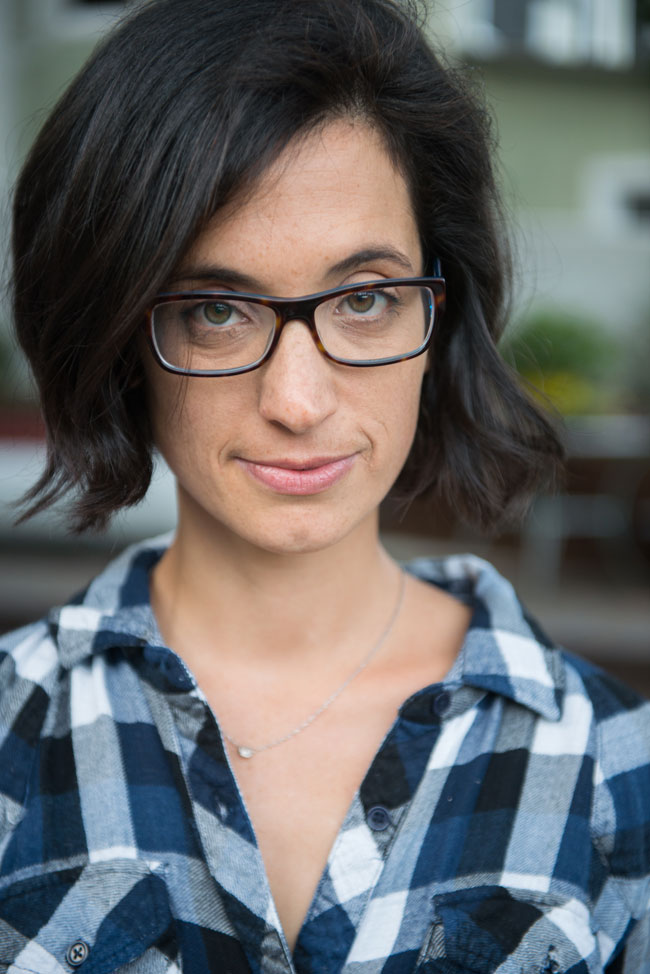
After listening to Sarah Treem tell her story – the one that led her to create and run Showtime’s The Affair – the first thing any aspiring writer would want to do is pack up their laptop, say goodbye to Brooklyn, and join the ever-growing team of Hollywood TV writers. But before that one-way flight to Los Angeles is booked, Sarah would advise to take a step back. Slow down. Sarah knows, first hand, that a good story needs time to grow into itself— the same goes for writers.
Before The Affair, Sarah wrote for Netflix’s House of Cards, as well as HBO’s How to Make it and America and In Treatment. She didn’t quite expect her career to result in Emmy nominations or Golden Globe wins, because Sarah didn’t exactly plan for a career in television. Her background is theatre, and it is that environment that taught her the confidence, courage and capability to eventually not only shine in a writer’s room, but to manage one.
Writing plays gave Sarah the space to develop her voice, and perhaps more importantly, it taught her how to stand up for it. As a showrunner for a television series, Sarah is, quite literally, running the show. Every detail of The Affair comes from Sarah; it’s her voice, her vision, her final decision on lighting, wardrobe and the last act cliffhanger. She needs to recognize not only what story should be told, but the best way it should be communicated.
“It’s not reliant on someone telling you how great an idea or character is. This is your gut,” Sarah explains.
Fifteen years ago, a good story wasn’t always that good. Since then, television has moved mountains, and listening to Sarah discuss the entertainment industry is like watching her push them herself. She is quick to point out that there is an urgency in today’s television to reach a conversation that didn’t exist during the prime of I Love Lucy or Knight Rider. Throughout the decades, she explains how different artistic mediums have become primary waves in which culture reflects back at itself: plays in the 50’s, maybe rock music in the 60’s and 70’s, and film after that. Now, Sarah calls it television’s turn, the zeitgeist of our era, and she nods its thanks the influx of playwrights working in television.
Before the early 2000’s, television did not rely on heavily, or even overly, complicated characters. Now, playwrights and their innate skill for character development are creating personalities like Mort from Transparent and Piper from Orange is the New Black. Many of these writers, like Sarah, learned from theatre that characters are more than quirky people, but archetypes mixing with the unconscious idling. Moving Mort and Piper onto the screen has pushed out characters like Lucy Ricardo and Mr. Roark, clearing space for the expansion of theme, conflict and content. “Television is [a good platform] to talk about something universal,” Sarah says. “Partly because it’s not about entertainment anymore.” For Sarah, it’s more than that; it’s tackling current social issues and having a role in growing this industry as it explores groundbreaking questions.
Whereas the theatre was once reserved to examine existential questions, shows like Sarah’s are now taking a stab at them too. “If you want to come into this medium, come in with great expectations and big thinking,” she comments, explaining that television is reaching its stride, mainly because the writing is reaching its stride. It pays to think large and have a vision, but first, she advises, understand what it is you want to say.
If playwriting is where you started, stay there. At least for now, she adds. “People are using theatre as a stepping stone to TV, but if you love theatre, write for theatre. Develop a voice, figure out what you care about and why you’re writing. Become a good writer, and when your plays find outlets… put [them] up.”
A good story is a good story, and it is a rather cinematic one that sparked Sarah’s career as a television writer. She was teaching at a summer camp in Maine when she got a call from Hollywood: “Do you want to come to California to work on a TV show?” At the time, Sarah was fresh out of Yale Drama, starting her playwriting career in New York City while simultaneously writing for HBO’s In Treatment. When actor Gabriel Byrne read her episode, he demanded producers bring her to set, and she was hired full time, sight unseen. As Sarah puts it, it was an unplanned combination of luck and opportunity.
And that is what Sarah finds so hard about Los Angeles. Here, everyone wants to be a TV writer. “What seems to be harder is when people come to L.A. trying to do both [television and playwriting] from the beginning,” she explains. For aspiring writers, entertainment is hard to break into without something to differentiate themselves. When Sarah is a hiring a writer, for example, she’s not looking for someone to train, but an individual who can bring something of his or her own experience to enrich the show. If you come from theatre, then you’re a New York City playwright complete with a package: your productions and reviews, your confidence and voice. Theatre gives you experiences; but it doesn’t make it easier.
Sarah finds that some turn to television because they think writing in a group means less work, less effort. Sarah will tell you: that’s not true. Showrunners, like playwrights, are the ultimate voice of the final product. Television staff writers don’t have as much control; Sarah sends some of her writers’ scripts straight to air, while others she will rewrite entirely. There are different uses of the same toolkit, and Sarah has been on both sides of it.
There were times when she was younger and less creatively fulfilled when Sara called television writing her day job. But now, The Affair is her voice, her show, her story. The idea of a day job doesn’t really apply to her anymore. In fact, writing television has given Sarah the support to keep writing plays. She doesn’t find it a hardship to do both; Sarah’s not one to write a television script and a play at the same time. She’s myopic, doing one thing and seeing it through to the end. Only then, when it’s finished, will she move on to the next project.
“I never felt like I wanted to write play after play,” says Sarah. Now, she writes television for half the year, and during hiatus, she uses that time to work on a play. Sometimes she reaches for that television script, to tackle that story that has been broken down and discussed in a writer’s room for the past three months. Sometimes it’s the play, that story that has been kicking around her head that she’s eager to tap into. It may not be outlined, or fully-formed, but she starts writing and sees what happens. A good story is a good story, but writing them are completely different experiences – and she takes advantage of that.
After talking to Sarah, after taking that step back, perhaps you’ll realize what the heart of television and storytelling is: experience. And this takes time; it took television itself about a hundred years to become as great as it is. But when you’re ready— when you’ve grown into your voice, and your confidence and courage have the power to shift culture and conversation— “TV will be here,” says Sarah. And it’s only getting better.
For the rest of our Stage to Screen Series, click here.

Newly Available for Licensing – January 2026 (UK)

Newly Available for Licensing – January 2026 (US)

